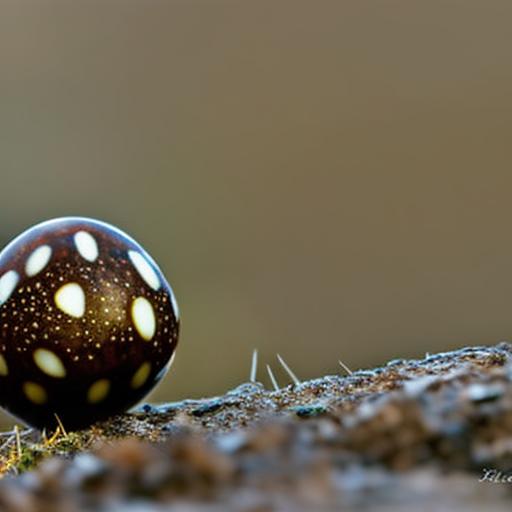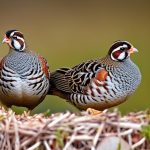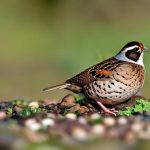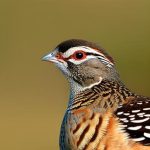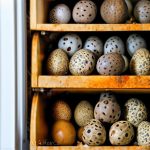Quail eggs are known for their high fertility rates, making them a popular choice for those looking to hatch their own quail. Fertility in quail eggs refers to the presence of a viable embryo within the egg, which has the potential to develop into a chick under the right conditions. Understanding the factors that contribute to the fertility of quail eggs is essential for successful hatching.
Fertility in quail eggs is influenced by various factors, including the age and health of the breeding quails, as well as environmental conditions such as temperature and humidity. The reproductive health of the quails plays a crucial role in determining the fertility of their eggs. Older or unhealthy quails may have lower fertility rates compared to younger, healthier birds. Additionally, the diet and overall care of the quails can impact their reproductive health and, consequently, the fertility of their eggs. Environmental factors, such as temperature and humidity, also play a significant role in the fertility of quail eggs. Optimal temperature and humidity levels are essential for the development of fertile eggs, as fluctuations in these conditions can negatively impact fertility.
Key Takeaways
- Quail eggs are fertile when they are laid, but fertility decreases over time.
- Factors affecting the fertility of quail eggs include age of the quail, nutrition, and environmental conditions.
- Fertile quail eggs should be stored in a cool, humid environment to maintain their viability.
- Viability of quail eggs can be checked using a process called candling.
- Hatching fertile quail eggs requires an incubator and careful monitoring of temperature and humidity.
- Maximizing the fertility of quail eggs involves providing a balanced diet, proper housing, and minimizing stress.
- Fertile quail eggs can be kept for up to 10 days before incubation, but the longer they are stored, the lower the hatch rate.
Factors Affecting the Fertility of Quail Eggs
Several factors can affect the fertility of quail eggs, including genetics, age, and environmental conditions. Genetics play a significant role in determining the fertility of quail eggs, as certain breeds may have higher fertility rates compared to others. Breeding quails with strong genetics and good reproductive health can help improve the fertility of their eggs. Age is another crucial factor that can impact the fertility of quail eggs. Younger quails are generally more fertile compared to older birds, so it’s essential to consider the age of the breeding quails when aiming for high fertility rates.
Environmental conditions also play a critical role in the fertility of quail eggs. Temperature and humidity levels must be carefully monitored to ensure optimal conditions for egg development. Fluctuations in temperature and humidity can negatively impact fertility, so it’s important to provide a stable and suitable environment for the breeding quails and their eggs. Additionally, the diet and overall health of the quails can influence their reproductive capabilities and, consequently, the fertility of their eggs. Providing a balanced and nutritious diet, along with proper care and management practices, can help maximize the fertility of quail eggs.
Storing Fertile Quail Eggs
Storing fertile quail eggs is essential for maintaining their viability before they are ready for incubation. Proper storage conditions can help preserve the fertility of the eggs and improve the chances of successful hatching. When storing fertile quail eggs, it’s important to consider factors such as temperature, humidity, and handling practices.
Temperature plays a crucial role in the storage of fertile quail eggs. Ideally, fertile quail eggs should be stored at a consistent temperature of around 55 to 60 degrees Fahrenheit. Fluctuations in temperature can negatively impact the viability of the eggs, so it’s important to store them in a cool and stable environment. Humidity levels should also be considered when storing fertile quail eggs. High humidity can cause condensation to form on the eggshells, which can lead to bacterial contamination and reduced fertility. It’s important to store fertile quail eggs in a dry environment with moderate humidity levels to prevent moisture buildup on the eggshells.
Proper handling practices are essential for maintaining the fertility of quail eggs during storage. Care should be taken to handle the eggs gently and avoid any sudden movements or impacts that could damage the embryos inside. Additionally, it’s important to store the eggs with the pointed end facing downward to help maintain the position of the air cell within the egg. By following these storage guidelines, you can help preserve the fertility of quail eggs and improve the chances of successful hatching.
Checking the Viability of Quail Eggs
Before proceeding with incubation, it’s important to check the viability of quail eggs to ensure that they have a good chance of hatching. There are several methods for assessing the viability of quail eggs, including egg candling and float testing. These methods can help you identify any potential issues with the eggs and determine which ones are most likely to hatch successfully.
Egg candling is a common method used to check the viability of quail eggs. This involves shining a bright light through the egg to examine its contents. By candling the eggs, you can observe the development of the embryo inside and identify any potential issues such as infertility or early mortality. Infertile or non-viable eggs will appear clear when candled, while fertile eggs will show signs of embryo development.
Float testing is another method for assessing the viability of quail eggs. This involves placing the eggs in a container of water to see if they float or sink. Fresh, fertile eggs will typically sink to the bottom of the container, while non-viable or older eggs may float due to air pockets forming inside. By conducting a float test, you can quickly identify any eggs that may not be suitable for incubation.
By using these methods to check the viability of quail eggs, you can select the best candidates for incubation and improve your chances of successful hatching.
Hatching Fertile Quail Eggs
Hatching fertile quail eggs requires careful management of temperature, humidity, and turning practices throughout the incubation period. By providing optimal conditions for egg development and following proper hatching techniques, you can improve your chances of successfully hatching fertile quail eggs.
Maintaining consistent temperature and humidity levels is essential for successful hatching. The temperature inside the incubator should be kept at around 99.5 degrees Fahrenheit for forced-air models or 101 degrees Fahrenheit for still-air models. Fluctuations in temperature can negatively impact embryo development, so it’s important to monitor and adjust the temperature as needed throughout the incubation period. Humidity levels should also be carefully managed to prevent excessive moisture loss from the eggs. Maintaining a relative humidity of around 45-50% for days 1-14 and increasing to 60-70% for days 15-18 can help ensure proper moisture levels for embryo development.
Turning the eggs regularly is another important aspect of hatching fertile quail eggs. Turning helps prevent the embryo from sticking to the inner membrane of the eggshell and promotes even development. Quail eggs should be turned at least three times a day during the incubation period until day 14 when they should be stopped to allow for proper positioning before hatching.
By providing optimal conditions for egg development and following proper hatching techniques, you can increase your chances of successfully hatching fertile quail eggs.
Maximizing the Fertility of Quail Eggs
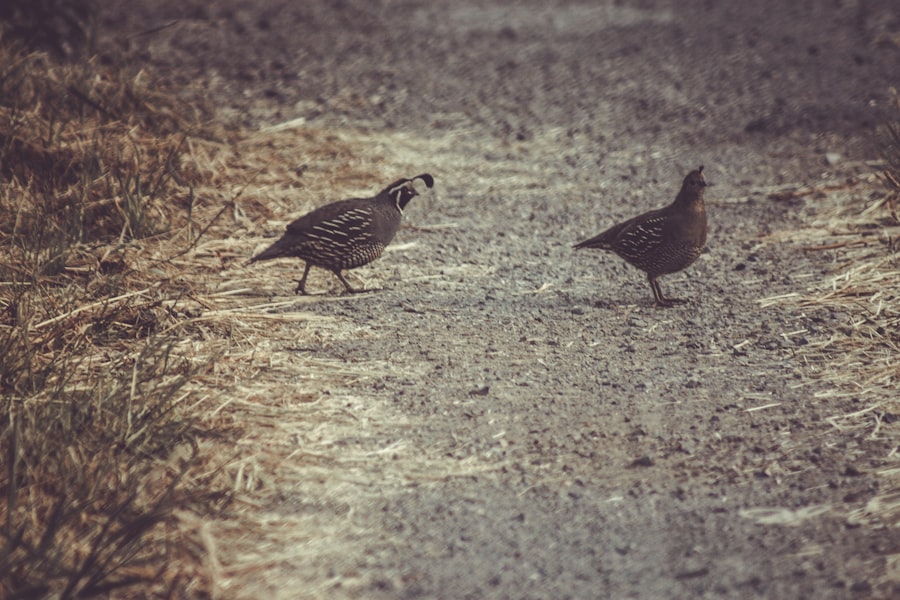
Maximizing the fertility of quail eggs requires careful management of breeding stock, environmental conditions, and overall care practices. By focusing on factors such as genetics, nutrition, and environmental stability, you can improve the fertility rates of your quails and increase your chances of obtaining fertile eggs for hatching.
Selecting breeding stock with strong genetics and good reproductive health is essential for maximizing fertility. By choosing healthy, young quails with proven reproductive capabilities, you can improve your chances of obtaining fertile eggs for hatching. Providing a balanced and nutritious diet is also crucial for maximizing fertility in quails. A diet rich in protein, vitamins, and minerals can help support reproductive health and improve fertility rates.
Maintaining stable environmental conditions is another key factor in maximizing the fertility of quail eggs. Providing a suitable habitat with optimal temperature and humidity levels can help promote healthy egg development and improve fertility rates. Additionally, proper care and management practices, such as regular health checks and parasite control, can help ensure that your breeding stock remains in good reproductive health.
By focusing on genetics, nutrition, environmental stability, and overall care practices, you can maximize the fertility of quail eggs and increase your chances of successful hatching.
How Long Can You Keep Fertile Quail Eggs
In conclusion, understanding the factors that contribute to the fertility of quail eggs is essential for successful hatching. Factors such as genetics, age, environmental conditions, and overall care practices play a significant role in determining the fertility rates of quail eggs. By carefully managing these factors and following proper storage, viability checking, and hatching techniques, you can improve your chances of successfully hatching fertile quail eggs.
When it comes to storing fertile quail eggs, it’s important to consider factors such as temperature, humidity, and handling practices to preserve their viability before incubation. Checking the viability of quail eggs through methods such as egg candling and float testing can help you identify which eggs are most likely to hatch successfully. Hatching fertile quail eggs requires careful management of temperature, humidity, turning practices throughout the incubation period to provide optimal conditions for egg development.
Maximizing the fertility of quail eggs involves focusing on factors such as genetics, nutrition, environmental stability, and overall care practices to improve fertility rates in breeding stock. By carefully managing these factors, you can increase your chances of obtaining fertile quail eggs for hatching.
In general, fertile quail eggs can be stored for up to 7-10 days before incubation without significant loss of viability if stored under proper conditions. However, it’s important to note that fertility rates may decline over time, so it’s best to use fresh fertile eggs for hatching whenever possible. By understanding how long you can keep fertile quail eggs and following proper storage and handling practices, you can maximize their viability and improve your chances of successful hatching.
It’s important to store fertile quail eggs in a cool and humid environment, ideally at a temperature of around 55-60 degrees Fahrenheit with a humidity level of 70-80%. Turning the eggs several times a day can also help maintain their viability. Additionally, it’s crucial to handle the eggs with care to avoid any damage to the delicate embryos inside. By following these guidelines, you can ensure that your fertile quail eggs remain in optimal condition for as long as possible before incubation.
If you’re interested in learning more about keeping chickens and creating a suitable environment for them, you might want to check out the article “Turning a Shed into a Chicken Coop” on PoultryWizard.com. This informative piece provides valuable insights and tips on repurposing a shed to accommodate your feathered friends. It’s a great resource for anyone looking to embark on their chicken-keeping journey. (source)
FAQs
How long can fertile quail eggs be kept before incubation?
Fertile quail eggs can be kept for up to 7-10 days before incubation. It is important to store them properly in a cool and humid environment to maintain their viability.
What is the best way to store fertile quail eggs before incubation?
The best way to store fertile quail eggs before incubation is to keep them in a clean and dry egg carton, pointed end down, in a cool and humid environment. The temperature should be around 55-60°F with a humidity level of 70-80%.
How can you tell if a quail egg is fertile before incubation?
To determine if a quail egg is fertile before incubation, you can use a process called candling. This involves shining a bright light through the egg to see if there are any visible veins or signs of development. Fertile eggs will show a network of veins and a small embryo.
Can fertile quail eggs be refrigerated before incubation?
It is not recommended to refrigerate fertile quail eggs before incubation, as the cold temperature can negatively impact their viability. It is best to store them in a cool and humid environment at room temperature.
What should be done if fertile quail eggs are not going to be incubated immediately?
If fertile quail eggs are not going to be incubated immediately, they should be stored in a cool and humid environment, pointed end down in an egg carton. It is important to turn the eggs once a day to prevent the embryo from sticking to the shell.
Meet Walter, the feathered-friend fanatic of Florida! Nestled in the sunshine state, Walter struts through life with his feathered companions, clucking his way to happiness. With a coop that’s fancier than a five-star hotel, he’s the Don Juan of the chicken world. When he’s not teaching his hens to do the cha-cha, you’ll find him in a heated debate with his prized rooster, Sir Clucks-a-Lot. Walter’s poultry passion is no yolk; he’s the sunny-side-up guy you never knew you needed in your flock of friends!

